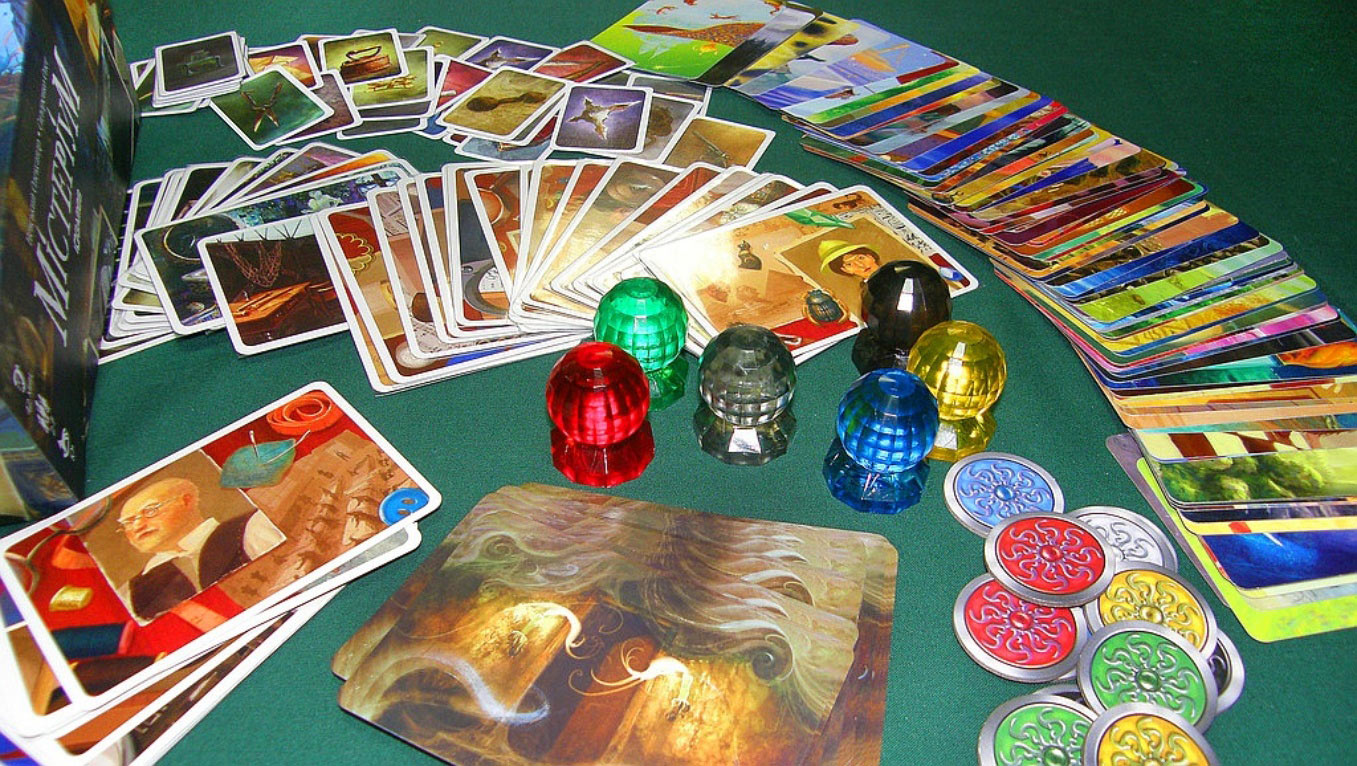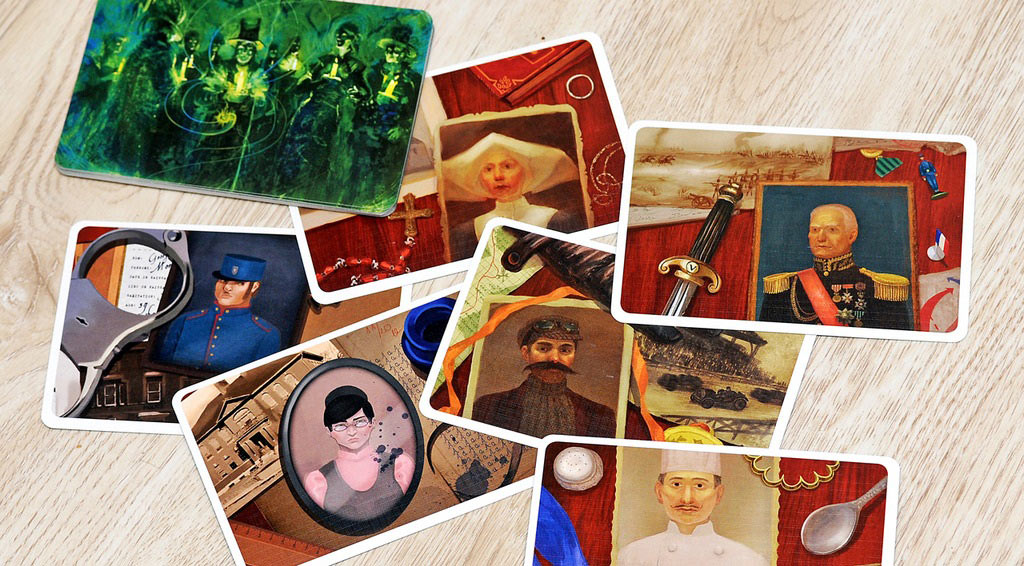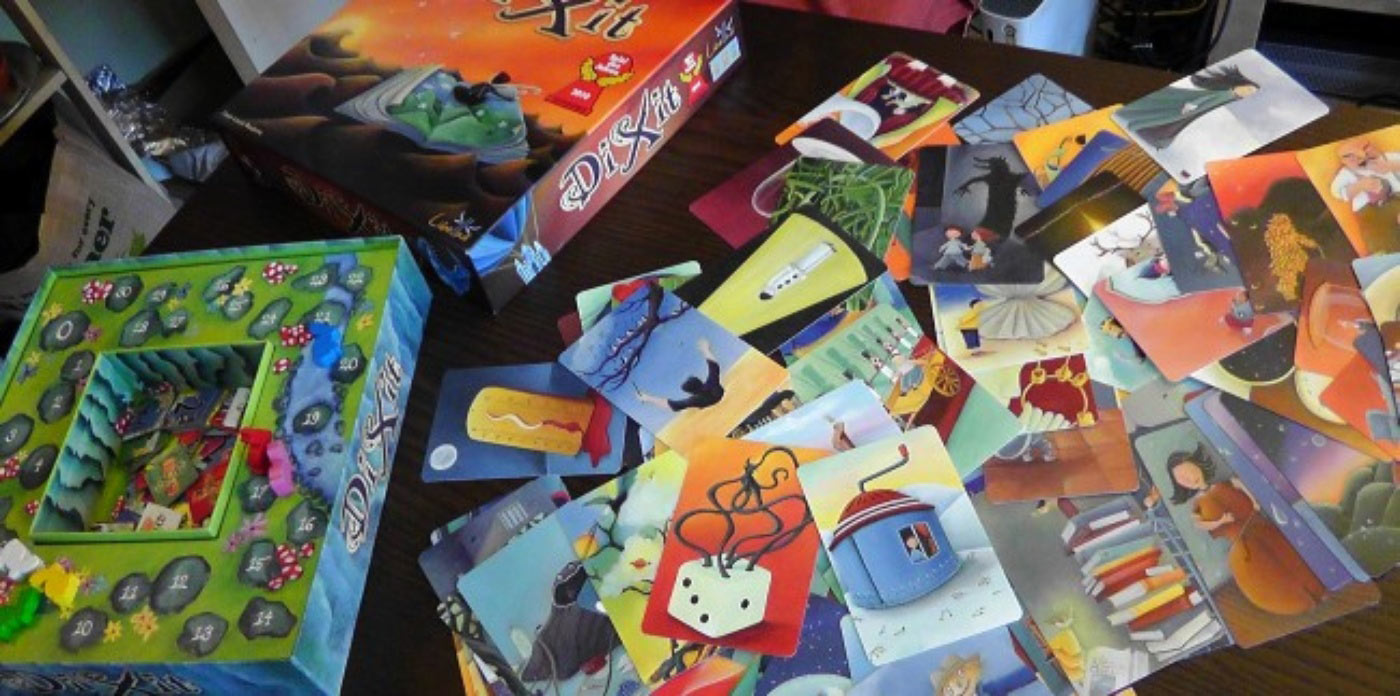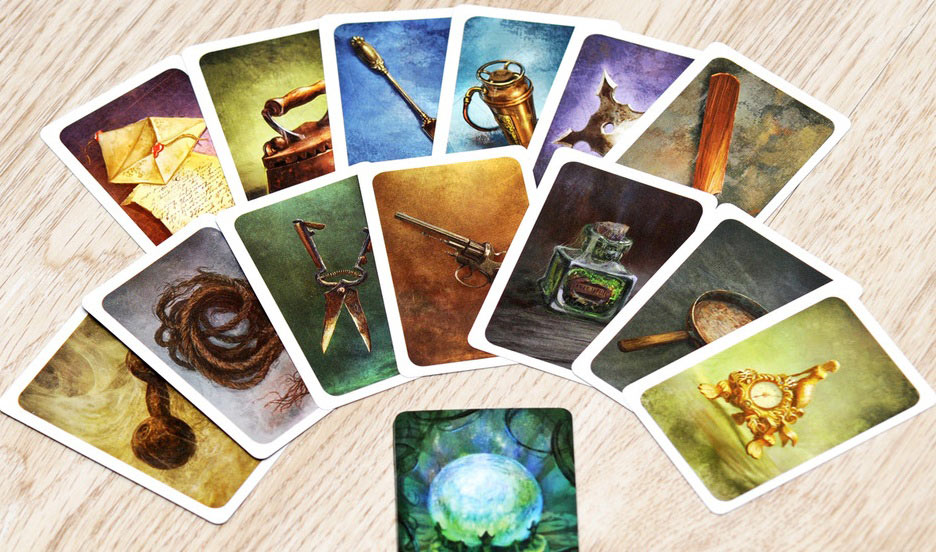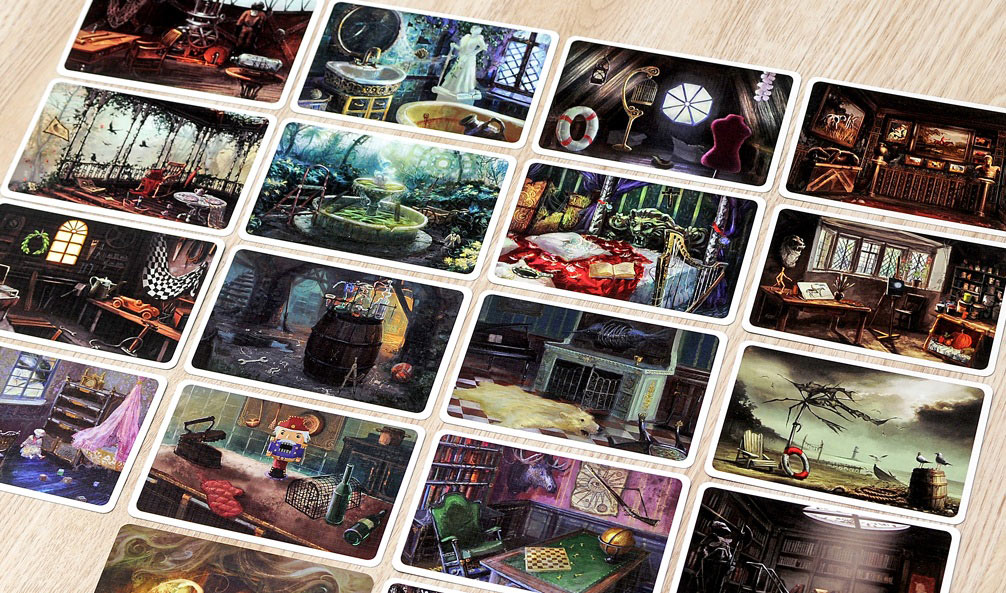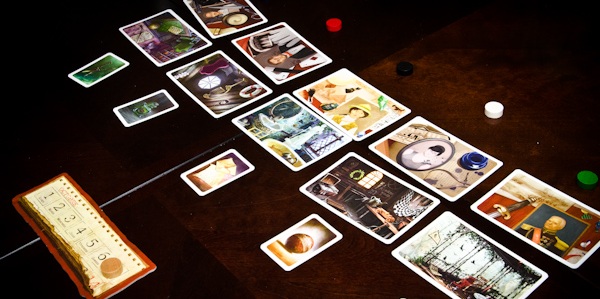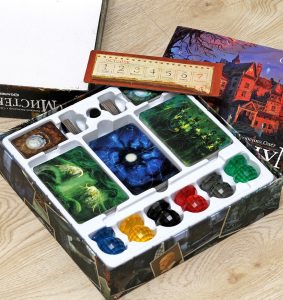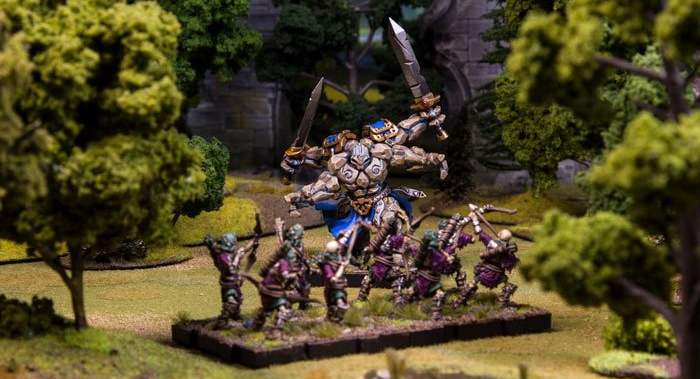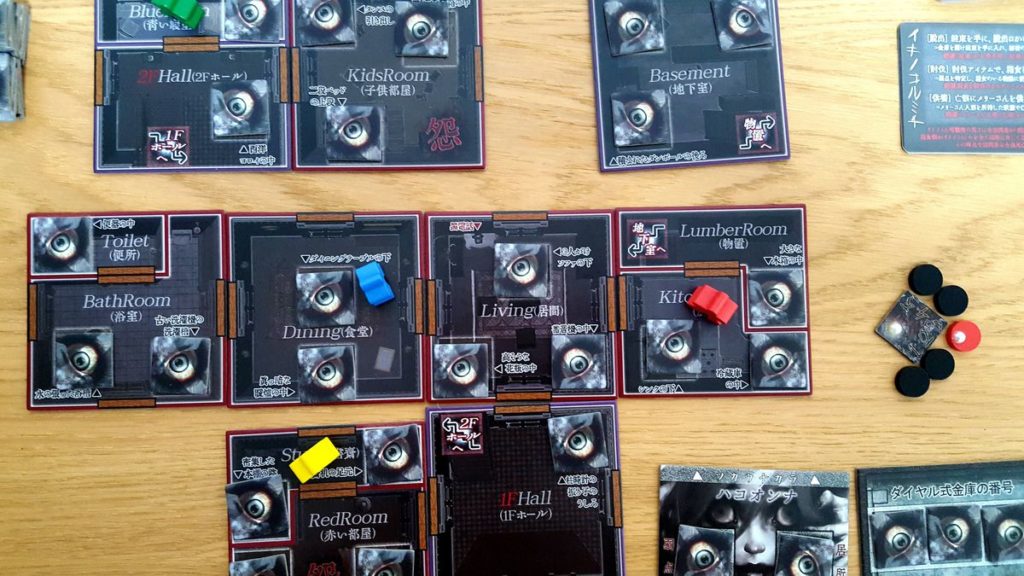Quinns: Everybody, stop! STOP!
[Montage of factory workers looking up from industrial machinery. Doctors and nurses looking up from their surgery. Soldiers locked in deadly hand-to-hand combat, who freeze and turn to face the camera as one.]
I’ve played a new board game and it’s really, really good!
[Amiable mumbling as factory workers loosen their aprons and turn to face the camera, doctors take five on the edge of the operating table as blood spurts into the air, soldiers dust one another off and sit cross-legged like toddlers.]
Mysterium is a co-op game of ghosts, murder and hilarious incompetence, in that order. All but one player is a psychic spending the night in a horrid house where a killing took place. The final player, who may not speak, is a ghost sending everyone else horrible dreams. The ghost must guide the psychics to the correct murder weapon, crime scene and culprit before the week is over, or… well, I’m not sure. Maybe the psychics have concert tickets. It doesn’t matter, and you won’t care. You’ll be laughing too much and thinking too hard.
An English language version isn’t out yet, but we’re going to glide past that like a spectre through a wall. Mysterium doesn’t have any language at all on any of its components, and an English manual can be downloaded right here.
In fact, getting the import might even be preferable. I’ve heard a rumour that the coming English & French 1st edition has been delayed because they’re re-doing all the spooktacularly grimm art to make a family-friendly game.
Nothing wrong with that, of course, but if you’re a fan of Shut Up & Sit Down, a site prominently featuring both murder and breathtakingly beautiful people, you’ll probably prefer the implied murder and breathtaking art of the original Ukrainian game. The suspects all seem threateningly vacuous. The locations are laughably horrible. The dreams? Oh my god, the dreams. They’re… well, the artist actually drew a massive stack of dreams.
I can’t express what a fantastic job they did. The art ranges from common dreams (running, following), to the sinister, to the mundane. Take a look for yourself:
As I ghost, I burst out laughing when I drew my first hand of dream cards. How on earth was I supposed to use a picture of elk limping through the forest? There was no way. But it was a puzzle that my brain immediately locked into like a stuck tyre trying to spin its way out of some mud, because the rest of my cards were just as useless. This was the game. Oh, no.
In detail, Mysterium’s rules are barely more complicated than I’ve already described. Each psychic player is secretly dealt a suspect, location and weapon, and the ghost is dealt a matching set. You shuffle the psychics’ cards together, adding further cards depending on the game’s difficulty level, and lay all these cards out in a gallery. Then the ghost hands each player their first dream, first guiding each player towards identifying their personal weapon, then (when they get that) their personal location, then finally their suspect, the ghost always drawing back up to a hand of six of these useless, hateful dream cards.
The psychic players then fall into frenzied discussion (I imagine them at a breakfast table, shelling eggs with practiced fingers) as to what their dreams might mean. “I got a chimney sweep, riding a unicycle, high above a city,” says one player. “I got a gentleman entering a… fish?” says another. And so on.
Finally the players commit to their guesses for the round, and the ghost opens their ghostly lips for just long enough to tell each player whether they were right… or wrong. The game ends after just seven nights of restless sleep.
Now, waaay back in the mists of 2011 we gave a favourable review to Dixit (seen above), but it’s a game we’ve felt underwhelmed by recently. Let me be abundantly clear. Mysterium is to Dixit what Arctic Scavengers or Trains was to Dominion- it’s a game that takes one of these never-before-seen ideas, then polishes it up and adds the storytelling that simultaneously praises the original concept and consigns it to the dumpster of history.
You light some candles and put on a creepy theramin playlist, and Mysterium is a game to rival anything I’ve played this year. For the psychics it’s a co-op puzzle free from the problem of one player telling everybody what to do, because nobody has any idea what the shit is going on, and for the ghost… well, let’s put it this way. You might want to consider a “poltergeist” house rule where they can start flinging tokens around the room if they start losing their mind. It’s quite the experience.
Here’s the problem. Let’s say you hand your friend Sally a sickly yellow dream card, because she specifically referred to the clock as a nasty shade of yellow last round. You want Sally to choose the clock, because the clock is her murder weapon. This is what follows.
Sally: Oh my god! I dreamt of a yellow ship! The clock is yellow. Maybe I should choose the clock.
Jeff: Whoah. Hang on though. There’s kind of a tub in the foreground of the picture, with another, tiny ship in it. Throwing stars are tiny. Maybe you should pick the throwing star.
[Sound of creaking as the ghost player shifts uncomfortably in his chair.]
Sally: I dunno. The big, yellow ship is just… bigger. My heart says it has to be the clock. The ghost can hear us talking, after all, and I was just talking about how yellow the clock is…
Peter: Wait! I’ve got it! Look how much water there is in this picture. Water’s a liquid. And so is the poison! The ghost is telling us it was poison!
[Thump of ghost player’s forehead hitting the table.]
Sally: Oh wow! That must be right! Peter, you’re so… dreamy!!
Peter: Haha! Good one, Sally. Now let’s solve this thing and go home.
Sally: I choose the poison!
Ghost: IT’S WRONG, YOU’RE WRONG, I HATE YOU
…at which point the ghost looks at their hand for next round and they have no more yellow cards, or circles, or clock-like mechanisms, or anything symbolising time or even the passing or time. What do you give Sally? It’s just fascinating. You’re like philosophical MacGyver.
I hope I’m not making this sound annoying? It really isn’t, because as with the very best co-op games, any situation you get into is your fault. You selected the difficulty, you selected the dreams, you selected your friends all those years ago, and the only mistake you can ever make is not knowing what conclusions they’ll jump to. But even when you fail there’s beauty in watching your friends talk their way past your hint (which they always seem to catch, but never linger on) through to some more-logical conclusion. It’s agonising.
It’s also an emotional rather than a logical hurdle you’re trying to get past, which is only ever interesting to fail at and hugely exciting to succeed at. After whole minutes of discussion, the look on your friends’ faces after they’ve placed their little tokens, and they’re all making eye contact with you, and one asks… “So did we get it right?!” It’s priceless. And then as an investigator you’re free to simply enjoy the company of your friends, the art, the theme, and try (hopelessly) to spot patterns in how this spirit communicates.
Finally, there’s some nice structural stuff to the design. Each set of problems feels radically different to solve, giving the game three semi-distinct acts. The murder weapons are individual items, which require seriously abstract thought patterns to connect to the dream cards. The rooms are always hugely cluttered, which leads to the opposite problem; a single dream could refer to multiple rooms. Then the suspects you’re trying to choose from (all depicted with the paraphernalia of their life) give the game an almost Dixit-like feel. Does a rat in the clothing of a human better represent the writer, or the soldier? The woman, or the man? City life or the countryside?
What surprised me the most, though, is that Mysterium actually ends with a dramatic final round where the investigators receive a single dream to tell them which of their collected suspects (replete with mugshot, location, and weapon) actually did the murder. Or which murder the ghost is really upset about. It’s not quite clear. But what IS clear is that this is an awesome, gameshow-like way to end the game. Because you’re working from all the in-jokes and observations of the entire game, the players are unlikely to screw it up. But it’s still a final question, relating to a final dream card, that the entire game hinges on. What a finale.
And then the game’s over, and suddenly the ghost can speak, and you get a big wet ectoplasm explosion of conversation as everybody goes “What the hell was THIS DREAM, GHOST?!” and the ghost says “WHY DIDN’T YOU F***ERS GET THIS,” and “You were pointing to his COAT?!” and so on and so forth and maybe somebody else wants to be the ghost, and maybe you crank up the difficulty, pour some more drinks and just go again. The night is young, after all, and the dream deck is huge.
We’ve talked a lot before about how great it is when a game gets everybody having fun before the game’s even begun. This is the best way a game can end, surely? With everybody talking about it breathlessly.
In case it’s not clear, Shut Up & Sit Down categorically recommends Mysterium. And I’m expressing this to you with a picture of a shadowy deer limping through a forest.
C’mon! How could you not get that one?! The deer represents DIXIT. It’s dead! Or dying. Or whatever.
[ghost throws cushion at you]
[Images courtesy of BoardGameGeek.com]

